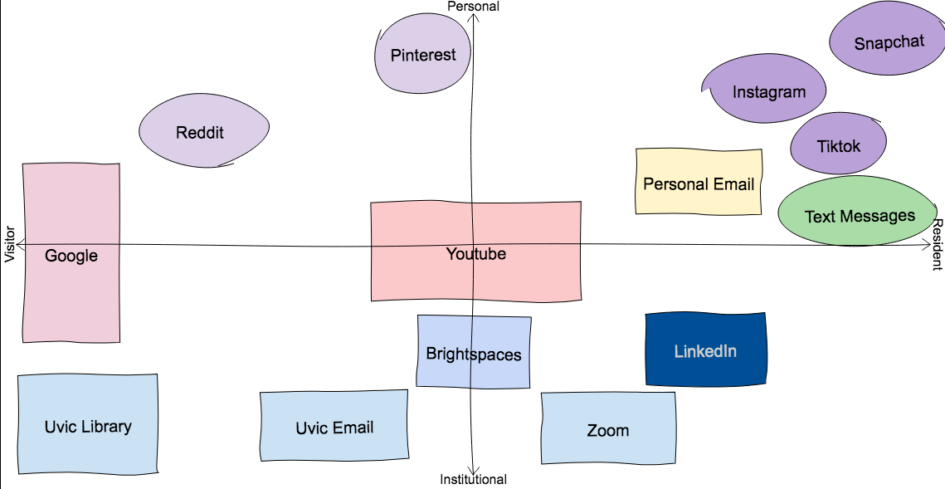Examine the application of social media to support learning
In this day and age, social media has a huge presence in our lives and it is safe to say that a large amount of the information that we learn can be supported through digital technologies. Various platforms allow and encourage learning online through communication and have given people a place to come and share ideas and information. For my group’s major project, we had chosen Discord as the platform that we were going to investigate and analyze. Discord is a communication-based platform where people create groups and servers where people can discuss and share information on certain topics. Discord would be a helpful social media platform that supports learning. The platform even encourages teachers to join to be able to communicate with their classes online and share coursework on a teacher server. Various other social media technologies also promote positive learning in many different ways. I find myself learning new things every day through social media platforms such as Tiktok, YouTube, Reddit, and so much more. Learning using online platforms can be helpful as you can reach out and connect with a large number of individuals who are from various demographics and have different life experiences. Social media broadens our learning range entirely from what it once was in the last couple of decades.
Explain personalized learning and its relation to learning theory
The framework in which we learn has been an everchanging construct that we as a society have had to adapt to. From reading George Siemens’ article, Connectivism: A Learning Theory for the Digital Age, I was able to thoroughly examine the concept of connectivism, which I had found to be quite interesting. In my showcase post, I had expand on connectivism and the theory of learning. I made note of how important our connections are with gaining knowledge and that we depend on other people to pass down the knowledge from their personal experiences. As individuals, we all have different needs when we are learning and may require alternative approaches to understanding information. My classmate, Ruth Ma, made a point in her week 3 wow & wonder blog post that I imagine many people can relate to, “I find learning from experiences like co-op placements, group projects, social media, personal learning, and collaborating with peers more beneficial and effective than just sitting in a lecture”. The traditional structure of teaching, such as through lectures and showing slides can sometimes be challenging for people to reach their full potential when learning. What I plan to take away from this when moving forward with my university career is to analyze the way I am being taught and see if there are ways that I can adapt and add to make the learning process more fitted to my personal needs.
Apply social media to develop a personal learning network in support of your personal and/or professional development
Social media can have a variety of different purposes depending on the individual and what they want to portray given a certain platform. George Veletsianos’, Emerging Technologies in Distance Education, gave me a strong understanding of how essential all the different social media platforms that I use are in regard to developing my own PLN. Some of the main social media platforms that I would consider to have a major impact in my personal learning network would be Instagram, Snapchat, Youtube, Twitter, and Tiktok. I generally use these for personal reasons, such as to stay connected with friends, family, and to reach people from all over the world. I also have LinkedIn, which would definitely fall into the professional sector of my PLN. After viewing group 8’s major project on Instagram, I feel encouraged and would really like to expand my own instagram as a way to connect with brands and other creators, as I only use mine for personal use.
Identify privacy issues and practice online behaviours that are legal, safe, consensual, and ethical
Online privacy is a major issue and can be a serious concern for the users of any social media platform. While digital platforms aim to keep us safe by tracking the content we consume and share, we allow for our data to be available to these platforms, which we do not have much control over. My classmate, Kayla Krug, made note in her wow & wonder #6 post about the concerns over ads and how you may ‘like’ a post on one platform or even search something on the internet, and there will be ads for it on multiple platforms. This has happened to me countless times and every single time it makes me feel uncomfortable and as if I am being watched. While surveillance is a huge concern for social media users, I sometimes feel as though not many people seem to have much response towards the corporations that authorize the data collection. In my 6th wow & wonder post I posed the question, do the benefits of social media outweigh the cons? This is something that I still wonder, however in some sense I feel that my personal response would be to say yes. I try my best to use social media in the safest way by not posting anything that is harmful to me or anyone else, but there remains the concernment on how social media tracking and data breaching will impact our society in years to come.
Recognize data ownership and licensing (Creative Commons, Copyright, Fair Dealing, and Public Domain) as a core practice when creating, sharing, or using resources online
Copyright, data ownership, and licensing has been a rising issue among users of digital media. Providing credit where credit is due is highly important for users of social media in order to be safe for yourself when sharing content, as well as for the audience to whom it reaches to be able to backtrack where certain information or content came from. Mia’s showcase post helped me further understand the how copyrights work and can have an impact on social media, such as Tiktok. She explains that when people make a tiktok that infringes on someones copyrights of a certain audio, the video that you made can be deleted and even go as for as to take legal action. It is crucial to check whether the content that you share not only falls in the boundaries of the community guidelines of a certain platform, but also that the ownership of the content you create is not infringing on anyone’s copyrights.
Practice digital, networked, and open literacies in support of learning about social media and personalized learning
There are so many important aspects to building a PLN and navigating digital media. I believe that one of the key elements to viewing anything that you find online is to be able to confirm if the information is accurate. When I was researching information for my major project, I had to take the time to learn about media literacy and all of the concerns about the spread of misinformation and disinformation. One of the sources that helped me grasp the concept was through a Youtube video by Crash Course. This was very fascinating to me and I feel that I have learned a lot about creating and consuming content. I feel that this translates well into this course as we have used hyperlinks to connect the information we refer to in order to minimize any misinformation. Another point I would like to add is how for our week 6 topic we read, Its not Misinformation. Its amplified Propoganda, by Renée DiResta. My main take away from this article is how social media can sway our perception of news, events, and any other information we come across. You do not have to be a lisenced doctor or a professional in a certain field to be able to share content, which can be quite harmful towards the public if the content being shared is inaccurate. Most digital media platforms have some sort of content tracker that can remove misinformation, but there is still a concerning amount of inaccurate information out there. I think that the saying, “don’t believe everything you see on the internet”, is a good notion to keep in mind while navigating life on social media.
To conclude, I would like to thank you for reading my blog post. This class has really opened my eyes and broadened my lens on technology and social media.


